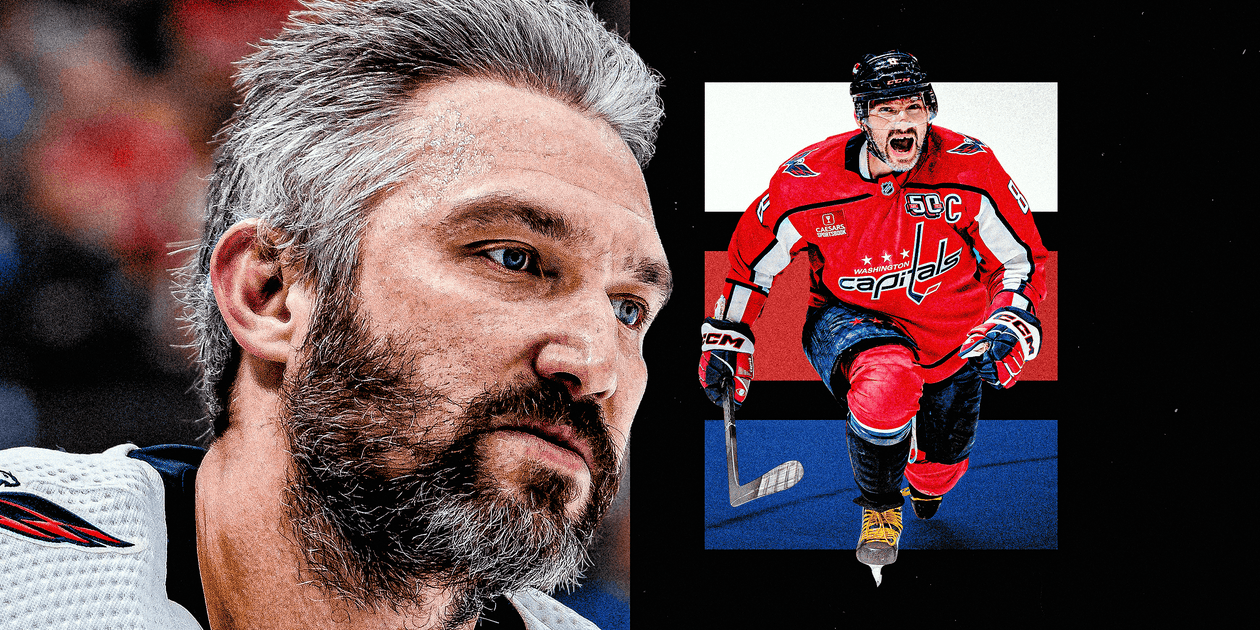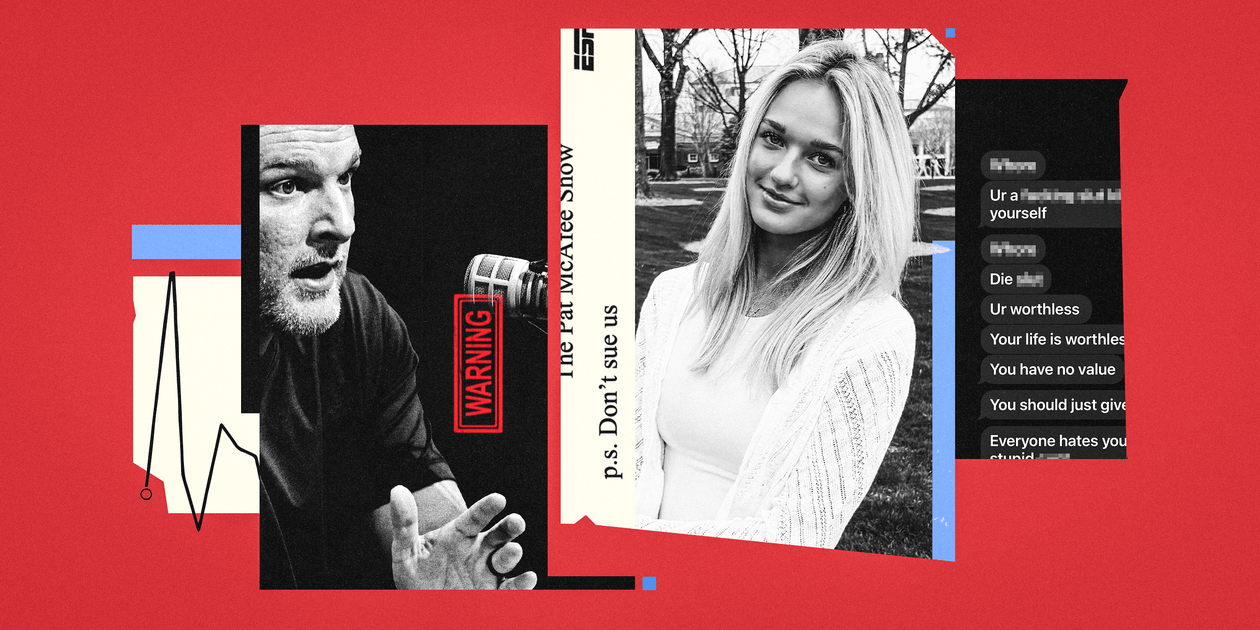The Ascent of a Legend: Alexander Ovechkin
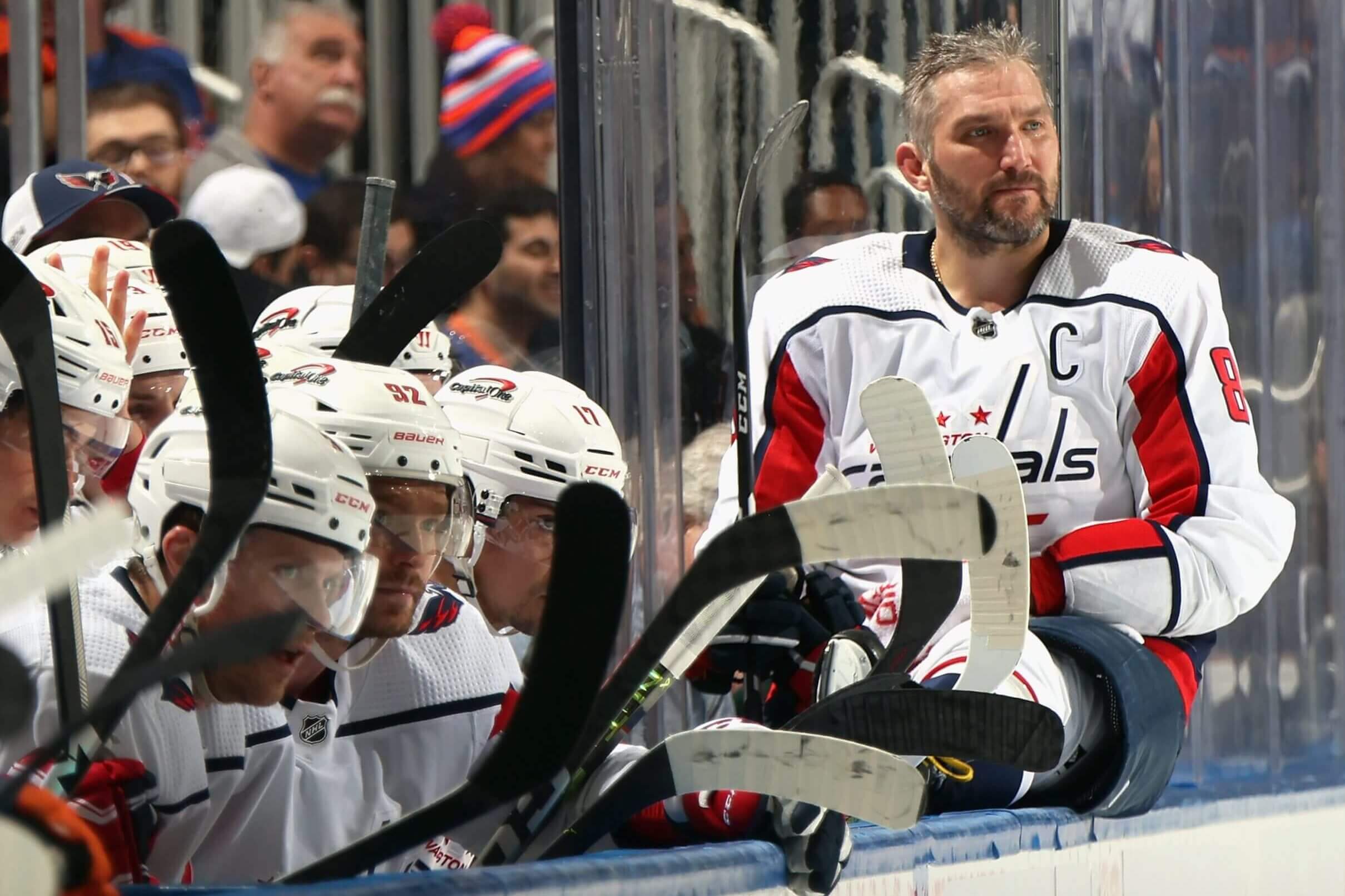
As Alexander Ovechkin leaps into the air, the space beneath him seems to stretch infinitely. The seasoned captain of the Washington Capitals defies gravity, bouncing higher and higher, hanging momentarily in mid-air as the laws of physics wrestle with his ascent. The small trampoline creaks and bends under the weight of this 39-year-old hockey titan, who eventually settles into short hops before committing to the ground.
It is a mere 90 minutes before the Capitals, currently leading the Eastern Conference, will strive to become the first team to secure a spot in the 2025 Stanley Cup playoffs. For those outside the Capitals’ locker room, that achievement will be a mere footnote. In just a short span, Ovechkin is poised to etch his name in history as the greatest goal scorer in NHL history, surpassing Wayne Gretzky’s legendary record of 894 regular-season goals.
Nearby, several of Ovechkin’s teammates are engaged in a light soccer game, keeping their spirits high in the hallway that leads to the rink. With a call for goaltender Logan Thompson to join the fun, “L.T.! Let’s go!” Ovechkin is an embodiment of camaraderie. His black shorts reveal the well-defined calves of a three-time Hart Trophy winner, while his matching hoodie frames the figure of a devoted father of two.
Above them, in the concourse of Capital One Arena in downtown Washington, D.C., Ovechkin’s presence looms large. The souvenir shop outside section 103 boasts every imaginable version of his Capitals jersey. Merchandise dedicated to Ovechkin’s image abounds, from sweaters and shirts adorned with his face to black T-shirts featuring the number eight surrounded by an endless parade of goats. His helmeted likeness dangles from oversized blue and gold necklaces, and an array of hats, mugs, shot glasses, and bobbleheads complete the fanfare.
The shop clerk shrugs nonchalantly, “It’s the Ovechkin sanctuary,” she declares.
Down on the ice, anticipation surges as fans rise to their feet during warm-ups, witnessing a helmetless Ovechkin gliding gracefully, his silver hair flowing behind him. He leaps against the glass, delighting a mother holding her baby, and lines up in his signature spot on the high left side, beyond the faceoff circle, firing one-timers into an unguarded net.
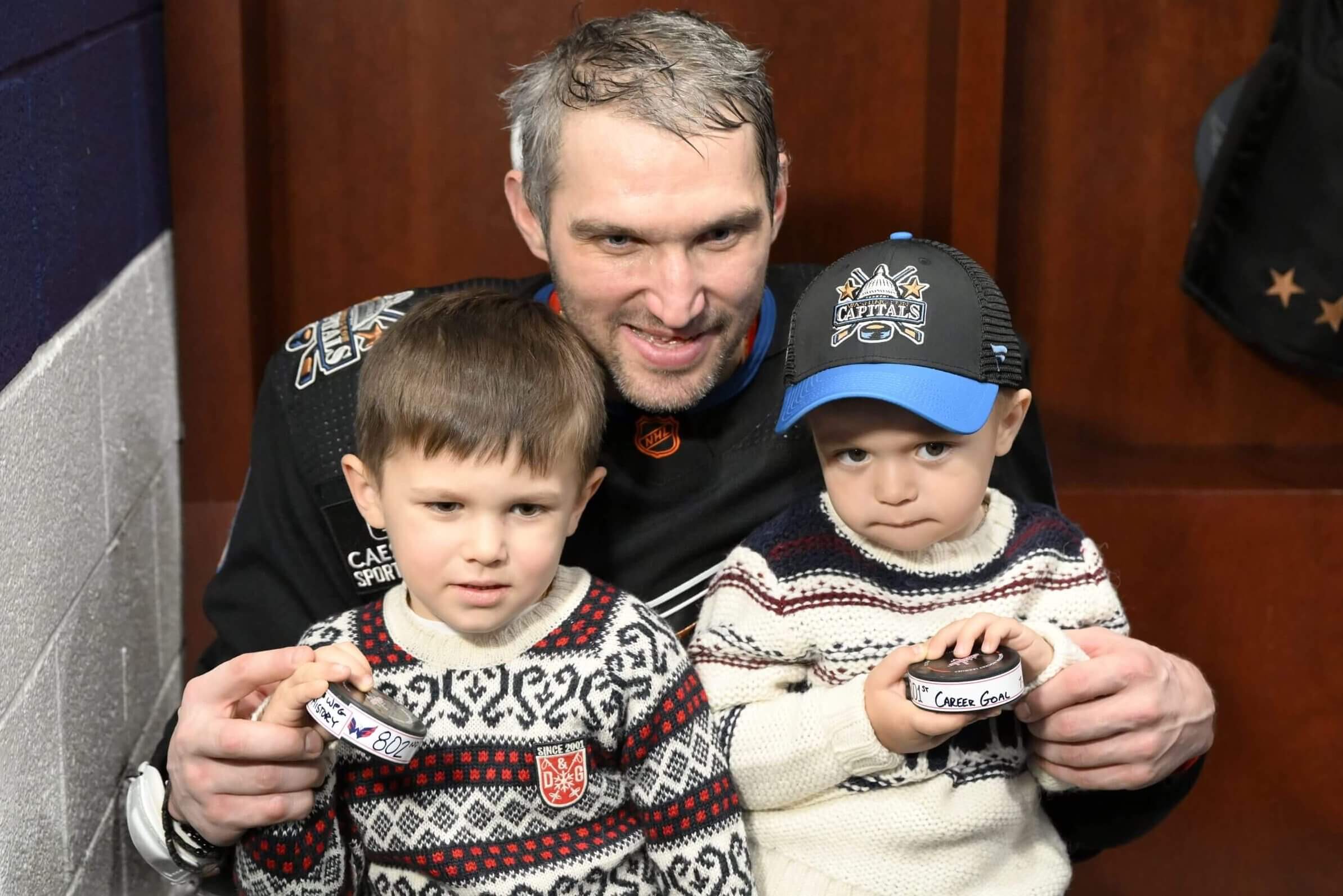
Throughout the first period, each time Ovechkin touches the puck, a wave of cheers rises from the crowd, a crescendo building with each passing moment. His shot remains a potent weapon, sharp and precise, yet he moves with a discernible slowness compared to the Russian machine who once dominated highlight reels. The shoulder pads he has worn for over 15 years bear the marks of countless battles, but today, the echoes of those hits are but whispers of past glory.
As he collapses forward onto the bench, Ovechkin rests his arms on the boards, huffing and puffing, his posture reflecting the toll of time. During a timeout, the greatest scorer in NHL history takes a moment to sip from a black water bottle adorned with white tape. In that moment, he is at home, surrounded by the ice that has defined his life.
One morning this spring, as he approached Gretzky’s record, Ovechkin found himself driving with his two young sons — aged 6 and 4 — who were creating delightful chaos in the back seat. Glancing in the rearview mirror, he caught sight of their beaming smiles. “Jesus, I wish I had that kind of energy,” he mused, a reminder of the simple joys of fatherhood.
He is just like you. In the driveway of his suburban home outside Arlington, Virginia, there stands a battered portable basketball hoop. Inside, a medley of Lego bricks and children’s toys litter the floor, shared equally by father and sons. The backyard, while spacious, lacks ornate landscaping or a luxurious pool, featuring only the same expanse of sod laid down when the house was built.
Ovechkin frequently takes Ubers around town, visits Hyde’s Social, a popular sports bar in Arlington, and pushes his kids in a cart down grocery store aisles. His culinary preferences lean toward the indulgent; he loves Papa John’s pizza and owns several franchises in the D.C. area. However, his pregame ritual typically consists of chicken parmesan from Mamma Lucia, an Italian restaurant chain.
Much like many residents in the D.C. area, Ovechkin is an ardent fan of the Commanders football team. He recently decided to attend a game with friends but neglected to call ahead, resulting in a long trek to the farthest parking lot from Northwest Stadium.
Sporting sunglasses and a hat to blend in with the throng of tailgating fans, Ovechkin made his way toward the stadium. However, by the time he arrived, a police escort had formed around him to clear a path, blocking hundreds of fans. An officer implored stadium security to let the hockey star in, only to realize that Ovechkin had forgotten to secure tickets.
So yes, he is just like you — until he isn’t.
On his 36th birthday, Ovechkin donned typical suburban dad attire — knee-length khaki shorts, a brown belt, and a tucked-in black polo shirt — as he attended an EDM music festival. Emptying his pockets, he handed his keys, wallet, and phone to his wife, who shook her head in disbelief. Wading through the pulsating crowd, he climbed onto the stage, where a member of the Lost Kings, a popular DJ duo, led the crowd in singing him a happy birthday. In a moment of sheer joy, Ovechkin hoisted the DJ onto his shoulders, as if he were carrying the Stanley Cup itself.
A creature of habit, Ovechkin often enjoys dining at Cafe Milano, an Italian restaurant in Georgetown that caters to the D.C. elite and visiting athletes. He sends a text to the restaurant’s head maitre d’ before arriving, prompting them to prepare his customary order: grilled calamari, burrata, several bowls of pasta bolognese, branzino, and a bucket of cold Peroni.
Ovechkin’s approach to diet and fitness starkly contrasts with the modern norms of professional athletes. Viral images of him indulging in Subway sandwiches and bags of Cheetos before games have circulated widely. When Brooks Laich posted a photo on Instagram of vegetables he intended to blend into an organic juice, Ovechkin cheekily suggested he add beer and Russian vodka to the mix.
His longevity in the NHL — nearing 1,500 games — astounds both peers and admirers alike. “He does the same thing now that he did 15 years ago,” says Nicklas Backstrom, the Capitals’ all-time assists leader and Ovechkin’s longtime teammate.
Evgeni Malkin, drafted second overall in the same year as Ovechkin, marvels at his countryman’s ability to balance fun with professional success, eating what he pleases while eschewing the strict training regimens typical among athletes. “His body is amazing. People talk about his weight all the time, but he doesn’t care,” Malkin observes. “He plays video games.”
A walking contradiction on skates, Ovechkin’s playful spirit is palpable. “PIZZA’S HERE!!!” exclaims a speech bubble accompanying a cardboard cutout of Ovechkin, holding a pizza box while donning a Papa John’s employee visor, greeting fans who attend open practices at the MedStar Capitals Iceplex in Arlington.
For two decades, Ovechkin has been one of the NHL’s most marketable figures. Yet when he arrived in Washington as a 19-year-old in 2005, the fans and media were uncertain of what to make of him. Clips of the 216-pound teenage prodigy dazzling against grown men during his time with Moscow Dynamo captivated fans yearning for excitement following a year-long NHL lockout.
Ovechkin found himself compared to Sidney Crosby, the composed and humble wunderkind from Cole Harbour, Nova Scotia, who rose to fame under the spotlight of Canadian hockey culture. While Crosby was dubbed “Sid the Kid,” Ovechkin was the exuberant Russian who celebrated goals with flair, barreling through opponents and confidently challenging benches. The contrast was stark, yet Ovechkin evoked a childlike joy that resonated with fans.
- “Alex is very influential. He’s always looking for goals. He has confidence he will score on every shift. This is a little unusual for a Russian player,” says Pavel Datsyuk, a two-time Stanley Cup champion and former captain of the Russian men’s national team. “It is not just the way he plays, but his approach — the yellow laces, the tinted visor.”
- Ovechkin scored two goals in his first NHL game and 52 in his rookie season. With each goal, his spirited celebrations irked the traditionalists of the sport, yet he remained unapologetic. He made it clear that as long as he played hockey, he aimed to win every trophy possible.
- During his first trip to Manhattan, he excitedly dragged his roommate Brian Willsie to Dolce & Gabbana, grinning like a child in a candy store. Struggling with ordering meals in English, he carried a dictionary throughout his rookie season, diligently circling new words and seeking translations from the team’s training staff.
Ovechkin’s first hat trick came in Anaheim, where he tripped over his own eagerness after scoring the overtime winner. The following night, he entertained teammates by singing a Russian folk song at the rookie party. Against the Coyotes, he netted a goal that left fans bewildered. “That was lucky,” he told reporters later. “I saw the replay. It was beautiful.”
At that time, Washington was not known as a hockey town. Jeff Halpern, a D.C. native who would become the team’s captain during Ovechkin’s rookie year, recalls the quiet atmosphere that surrounded the franchise before Ovechkin’s arrival. “There was a stillness to it all,” he reflects.
However, as the season progressed, that stillness transformed into a rising buzz. Ovechkin’s electrifying presence ignited the fanbase, and soon he was a household name. Following the Capitals’ 2018 Stanley Cup victory, Ovechkin’s and the team’s popularity soared to unprecedented heights.
Outside Cafe Milano, on the day of the Capitals’ Stanley Cup parade, fans flooded the street as players hoisted the trophy from the balcony. Inside the restaurant, others stood on the bar, showering patrons with celebratory Champagne.
The championship ushered in the legendary “Summer of Ovi,” a months-long celebration that Ovechkin embraced after 13 years of frustration. Since then, the atmosphere surrounding the Capitals in D.C. has remained electric. “It was a football town,” Halpern remarks. “Until he got there.”
The poster featuring Ovechkin still hangs in Wilson’s parents’ home in Toronto, alongside a signed stick from Ovechkin presented to his father after he assisted on Wilson’s 100th NHL goal. Ovechkin also fed Wilson the puck for his very first goal, signing the stick in Russian: “Assisted on first goal and hundredth goal. Congrats.”
Numerous players in the league possess some form of Ovechkin memorabilia. After every game, win or lose, Ovechkin is met with a small table of items to sign, often for members of the opposing team. Over the years, his sheer force of play and vibrant personality have garnered him admirers among even his fiercest rivals.
Crosby has marveled at Ovechkin’s relentless spirit, admitting that if he possessed a shot like Ovechkin’s, he would have likely been more selfish with the puck. Ovechkin, in turn, is an avid admirer of greatness, owning signed items from legends like Kobe Bryant, Lionel Messi, and Crosby himself. After dining with Gretzky and peppering him with questions in Los Angeles, the Great One sent Ovechkin the stick he used to score his 762nd goal, inscribed with the message: “To Alex. I love watching you play.”
Since that moment, Ovechkin has begun dating and signing each stick he scores with, mirroring Gretzky’s gesture, who often texts Ovechkin words of encouragement and advice on his game. “Sometimes I talk to Wayne, and he seems like a support guy for me,” Ovechkin shares. “Giving me advice, giving me a heads up, (telling me to) keep it going.”
Ovechkin, who embodies greatness, is also quick to bestow playful nicknames, which evolve over time. Early this season, noticing Jakob Chychrun sporting a headband while waiting for warm-ups, Ovechkin burst into song, belting out the title verse of “Bandz Make Her Dance,” a track by rapper Juicy J. This playful moment has since become a beloved ritual, with Ovechkin affectionately dubbing Chychrun “Bandz.”
The Capitals are woven together by their elder statesman. Ovechkin makes it a point to welcome each new player to the team, often reaching out via text or Instagram and inviting them to lunch upon their arrival. The franchise has transformed into a haven where players like Dylan Strome, Pierre-Luc Dubois, Rasmus Sandin, and Chychrun have rediscovered their footing after facing challenges elsewhere.
“You see a lot of guys come here, and their careers get revitalized,” Wilson notes. “They find their groove again, they’re comfortable, they like it. And that starts with Ovi.”
The atmosphere at Capital One Arena electrifies each time Ovechkin nears the puck. The crowd rises in anticipation at the mere hint of a shot, and the giant screen above center ice tracks his every move.
During stoppages, he signals for a new stick. Each game, Ovechkin selects five fresh sticks; he employs his own tape, cut with his own scissors, meticulously wrapped around the blade’s toe, spiraling to a definitive stop midway. Three sticks rest on the rack beside the Capitals’ bench, while the fourth, marked with a dot, is reserved solely for power plays.
In his younger days, Ovechkin would eagerly open shipments of sticks, holding each one for mere moments before determining its viability. He would sift through dozens, sorting them into piles of good or bad. He possessed an innate understanding of the game. Nowadays, his sticks come from a specialized company in Winnipeg that reverse-engineered a perfect model for him, crafted to his exact specifications. Even among identical sticks, Ovechkin discerns subtle differences known only to him.
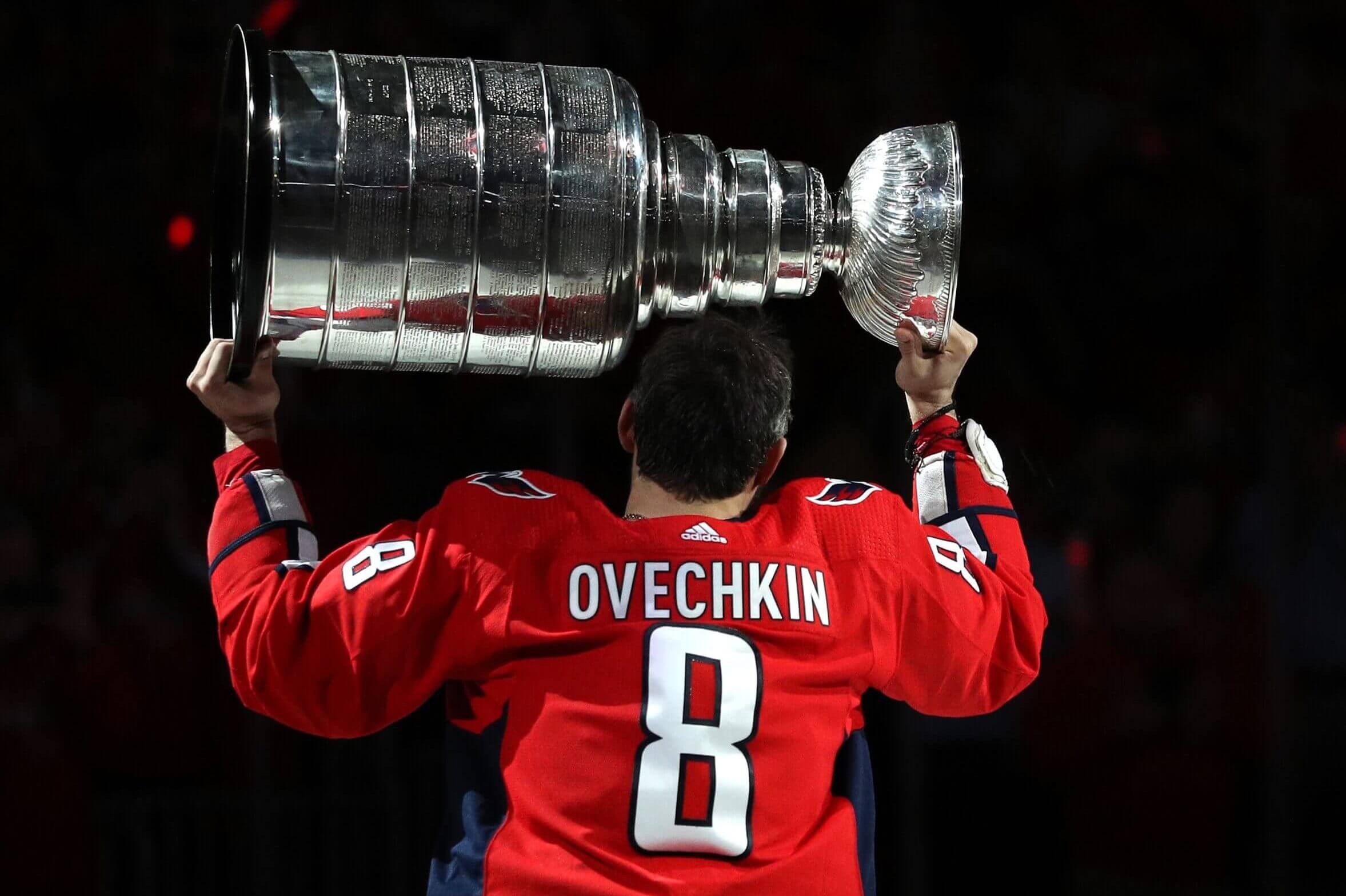
Much of his ritualistic reliance on routine stems from his family background. Throughout his career, Ovechkin’s mother, Tatyana — a two-time Olympic gold medalist and world champion basketball player — and his father, Mikhail, a professional soccer player, maintained a tradition of sitting apart, solely as a matter of routine.
Ovechkin’s fun-loving spirit and infectious laughter are traits inherited from his father, friends assert. Mikhail would often stroll through the crowd during intermissions at Capitals games, greeting fans, before stepping outside for a smoke. He possessed a hearty, full-belly laugh that he passed on to his son. The loss of Mikhail two years ago at age 71 weighed heavily on Ovechkin. “It’s tough because it’s your closest friend — your parent, your dad,” he reflects. “But you can’t go down. You have kids. You have a wife. And this is life.”
Returning to Moscow for the funeral, Ovechkin took a week away from the team, grappling with the weight of tragedy that has shadowed him since his older brother Sergei died in a car accident. Rarely discussing Sergei’s death with close friends, Ovechkin often kisses his glove and points skyward in honor of his brother whenever he scores. He named his first son after him.
Fatherhood has provided Ovechkin with a newfound perspective on life and career. “Family is the number one priority,” he asserts. “I have things that I have to think about. Not hockey — all the small things. Do they have food? How do they feel? Are they sick? As soon as everything is fine over there, you feel much happier.”
As the most celebrated Russian in Washington, Ovechkin embodies a duality. His actions on the ice and words off it carry immense weight beyond the sport. When he is away from D.C., he spends time at a home in Florida or a country house on the outskirts of Moscow. Any return to Russia is a grand affair, his impact on sports, fashion, and culture undeniable. He is revered as a national hero.
Malkin, often regarded as the second-best Russian player of the last two decades, emphasizes that there exists no more prominent athlete in Russia than Ovechkin. Throughout his NHL journey, Ovechkin’s allegiance to his homeland has remained steadfast. He has represented Russia in every international competition he has been eligible to play in, serving as an ambassador for the Sochi Olympics in 2014 and again for the FIFA World Cup in 2018.
“Everybody is following him right now,” says Viktor Kozlov, who played alongside Ovechkin in the early years of his Washington career. Yet, the context of Russia’s invasion of Ukraine casts a shadow over Ovechkin’s pursuit of the record. Throughout his career, Ovechkin has expressed support for Russian President Vladimir Putin. His Instagram profile picture, which has over 1.6 million followers, features a photograph of Ovechkin with Putin. He campaigned for Putin on social media ahead of Russia’s 2018 election.
Since the onset of the war in Ukraine in February 2022, the International Ice Hockey Federation has banned the Russian national team from international competition. Ovechkin has not represented his country since 2019. “Please, no more war. It doesn’t matter who is in the war — Russia, Ukraine, different countries,” Ovechkin pleaded when asked about the invasion shortly after it began.
When questioned about his continued support for Putin, Ovechkin responded, “He’s my president. I’m Russian, right? I am not in politics. I’m an athlete.” As Russia’s most cherished athlete and a prominent export, Ovechkin has faced backlash for his statements. Dominik Hasek, widely considered one of the greatest goaltenders in NHL history, has called for fans not to celebrate Ovechkin when he breaks the record, arguing that his status as a Russian sports star serves as a form of endorsement for Putin’s actions.
For many, this context complicates Ovechkin’s narrative. For others, it does not. “In Russia, it’s not a controversy. We love our president,” Kozlov asserts. “This is Alex’s decision. He decided to be in the picture with our president. That’s respectable, too.”
Jonathan Harris, an emeritus professor of political science at the University of Pittsburgh specializing in comparative politics and the Russian Federation, believes that Ovechkin’s past comments and his support for Putin should not be surprising. He explains that Russian nationalism is not analogous to American nationalism, which emerged in a more diverse context. In Russia, there is a prevailing belief that the nation and ethnicity are intrinsically linked.
“If a hockey player is invited to stand with Putin, he is in no position to say, ‘Sorry, I’ll just go stand someplace else,’” Harris argues. Prominent figures in Russia are acutely aware of the implications of their actions. “To criticize Russian nationalism would make you essentially an enemy of the people as far as the government is concerned,” he continues. “Russian stars are very aware of the context in which they operate; they’re not naive.”
In the gaze of every eye, Ovechkin moves alone as he spots Aliaksei Protas at the edge of the net. The puck finds its way to the Great Eight, and in that moment, Ovechkin shoots. Ovechkin scores. The laws of the sport align perfectly. The atmosphere ignites — the crowd, the roar, the horns, the sirens, the cowbells — and the Capitals find their star, their gravitational center, after his goal. There are still two periods to play, but everyone has already witnessed what they came to see. The number flashes on the large scoreboard in the arena: 888.
This number is omnipresent — emblazoned on the jumbotron, embroidered on the shirts of thousands of standing fans, visible in the concourse, and soon to flood the streets as a white SUV carries a dummy of Ovechkin suspended mid-air, diving toward a goat clad in a Gretzky sweater. The figure of eight symbolizes infinity.
And so it continues, on and on. Ovechkin will keep scoring as the previously unimaginable reach of greatness unfolds beneath him. However, one day, Ovechkin must come down. The exuberance of cosmic hyperbole cannot alter this mortal truth. As he approaches a realm no player has traversed before, Ovechkin confronts the reality that the Capitals — that the game — will one day exist beyond him. His fans and teammates are not yet prepared to face this eventuality.
“I don’t think people realize the magnitude of what Ovi is to this team and this city,” Wilson reflects. “He’s obviously always going to be a legend, but it gives you a weird feeling to think about this team without him.”
The following morning at the Capitals practice facility in Arlington, another throng of fans gathers, hopeful for a glimpse of the real Ovechkin. They stand just beyond the tinted glass windows, where he peers across a table — his beard flecked with white, his blue eyes shimmering with shades of gray — contemplating what life will be like when he is no longer chasing records. He’s not quite ready to answer that question. Ovechkin grins, looking weary yet content. “It’s a question for later,” he says, “when I can relax. Until then, it’s just another ordinary extraordinary day.”
(Illustration: Will Tullos / The Athletic. Photos: Jess Rapfogel, Julian Avram / Getty Images)
